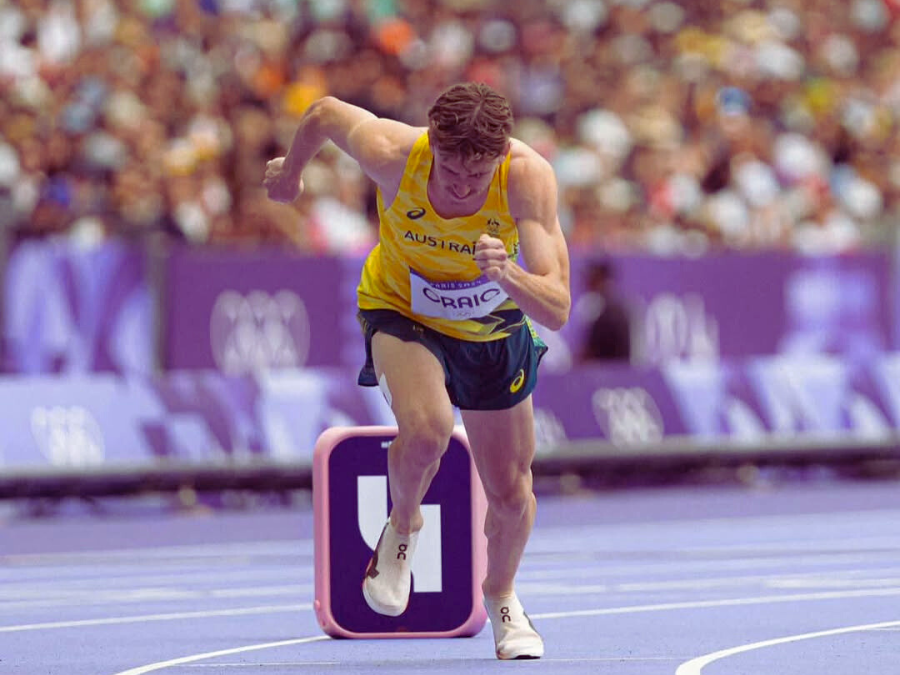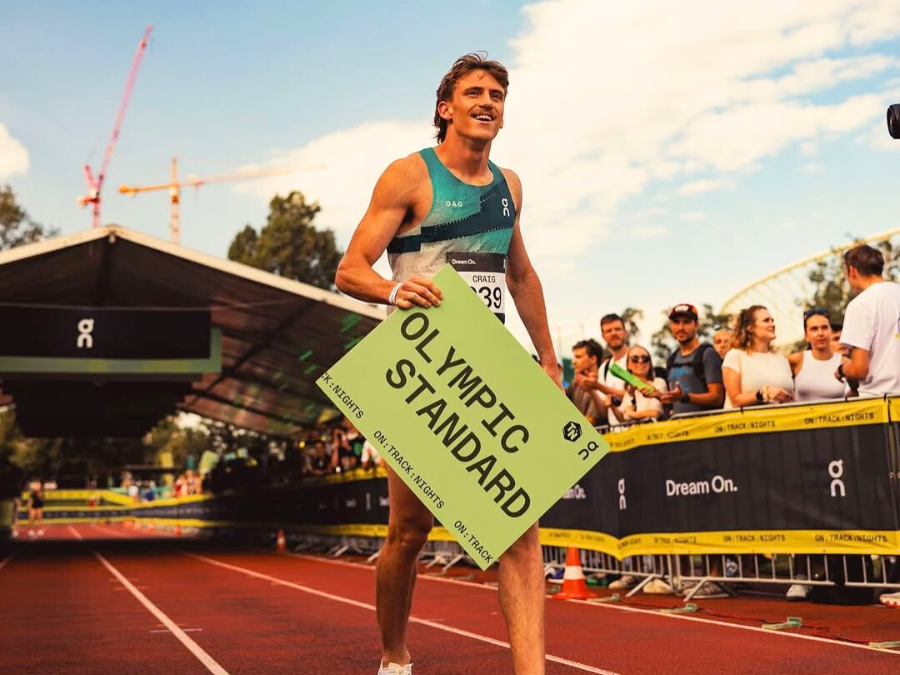In our RT Snap Q&A series, we’ve had the privilege of interviewing some of the world’s best runners, delving into their extraordinary journeys, celebrating their achievements, and exploring the unwavering dedication that defines their careers.
Peyton Craig
- Born: March 28, 2005
- Nationality: Australian
- Middle-distance
Peyton Craig’s journey to becoming one of Australia’s most promising middle-distance runners is a tale of persistence, overcoming setbacks, and achieving greatness. The 19-year-old Sunshine Coast native recently made waves in the athletics world by clocking a personal best of 1:44.12 in the 800m at the Track Night Vienna in December 2024. This impressive feat not only earned him a spot on Australia’s Olympic team for Paris 2024 but also cemented his place as the third-fastest Australian in history for the event. Craig’s journey to this moment was anything but straightforward, with multiple hurdles along the way, including a lengthy battle with a shin injury that sidelined him for nearly eight months.
What sets Peyton apart is not just his raw talent but his determination to learn from each challenge. Craig’s decision to focus exclusively on track running—after years of excelling in triathlon—was a pivotal moment in his career. His coach, Brendan Mallyon, who has worked with Peyton since he was just 12 years old, has been instrumental in refining his approach to the 800m. The pair’s relationship is built on trial and error, with Craig experimenting with various techniques and strategies to improve his performance. The duo’s persistence paid off in Vienna, where Peyton finally broke through the qualifying mark for Paris 2024 after a string of near misses earlier in the season.
Craig’s success in Vienna is a testament to his unwavering drive and his ability to stay focused under pressure. As he looks ahead to the 2024 Olympics, he is not just thinking about the achievement but about the journey that got him there. It’s clear that Peyton Craig’s story is one of overcoming adversity, growing from every setback, and embracing the lessons learned along the way. With a promising future ahead, he is poised to make a significant impact on the world stage, continuing to push the limits of what’s possible in middle-distance running.
View this post on Instagram
Personal Bests
- 800 Metres – 1:44.11
- 1500 Metres – 3:44.07
- 3000 Metres – 8:12.63
- Mile – 4:12.05
- 5 Kilometres Road – 15:04
RT: Was there a moment or person that first got you excited about running?
Peyton: A standout moment for me that first got me really excited about track was in 2022 at our National Championships. At about that time I was still both balancing triathlon as well as track and was having some real difficulty with choosing what sport I wanted to try and pursue full time. I was able to win the men’s U20 1500m and qualify for world junior championships that year with that run. After that race I was really excited about the opportunity to represent Australia on the track and it made me really curious as to how good of a runner I could be as I hadn’t done a whole lot of track racing at a high level up to that point.
RT: What’s a regular training week like for you, and is there one workout you always look forward to?
Peyton: A regular training week for me is quite different to a lot of the traditional running training weeks. I still enjoy incorporating some swimming and cycling sessions from my background in triathlon, as it offers great aerobic benefits without battering the body as much as running does. In a regular week I’ll run 5 times, which includes a speed session, two threshold/tempo type sessions, a lactic tolerance session (when in race season) or hill reps, as well as a long run. This is also along with 2-3 squad swimming sessions and 2-3 bike sessions a week which is typically all just aerobic work. I also have 3 gym sessions throughout the week.
RT: Can you tell us about a race that felt unforgettable and why it holds a special place in your heart?
Peyton: This is really quite an easy question for me now and it has to be my Olympic heat in Paris 2024. It was like nothing I ever imagined I could experience. I was extremely nervous the day of my heat to the point that I actually vomited in the warmup I was so anxious. It was quite the mental challenge getting over the fact that I vomited in the warm up as I’ve never ever done that before, so to deal with that in my Olympic debut was really challenging. However, once I stepped out onto the track all those thoughts went away when I looked up into the stands and saw how many people were there, in the moment I had a real sense of belonging and it’s very cliché but it felt like I was born to be there. The race its self, I was super happy with how I ran, I feel like I made some really smart decisions and the sense of satisfaction I had crossing the line, knowing I was into the semi’s was like nothing I’ve ever experienced before and is unforgettable.
View this post on Instagram
RT: During tough training or races, have you ever wanted to stop? What do you tell yourself to keep going?
Peyton: I think in almost every hard session I do, there’s a point where I want to stop. The way I overcome this is by thinking of the goals I’ve set myself, I always try and set lofty goals as I find it really helps me keep myself accountable. I know it’s simply not possible to achieve them if I don’t fully commit myself to my training and everything I do. I also think of how it feels to know that you’ve given up or not given it your everything, it’s the worst feeling in the world and guilt of knowing you could’ve done something will eat you alive.
RT: Who has been your biggest supporter or inspiration in running, and what’s the best advice they’ve given you?
Peyton: My biggest supporter so far in my running career is definitely my first track coach Brendan Mallyon who coached me to Paris this year. I’ve known Brendan for the past 8 years and he’s been there for me through my entire journey coming through the junior ranks and now into the elite level. The best piece of advice I’ve received from him is so very basic but honestly is the underlying attribute to every piece of success is that ‘consistency is key’. This is something me and him have always carried through our training and have a large focus on trying to complete 90% plus of all assigned sessions throughout the season. Brendan’s certainly had the most influence on my career so far and I certainly wouldn’t be in the position I am now without him.

RT: Lots of young runners look up to you. What’s one lesson from your journey that you think could help them?
Peyton: A lesson I learned and although it was extremely tough at the time I’m very glad now that I experienced it was at my first world u20 championships in 2022 in the 1500m. I was extremely excited to compete at my first world champs and was heading into it thinking I was a good shot at making the final based of my PB at the time. Come race day and I had an absolute shocker of a race, running around 11 seconds outside my PB and coming near last, I was so embarrassed at the time and couldn’t believe that’s how I performed for my first time representing my country. It wasn’t until a couple days after the race, talking to the people closest to me that i realized this was a huge lesson and something that will help me throughout my career. Yes running 11 seconds outside my PB at a world champs wasn’t ideal but it made me realise every single race of my career is a learning experience, both the good but especially the bad. I didn’t have the best lead in to that race, unfortunately getting covid for the first time a couple weeks before departing but this helped me learn that there’s only so many things you can control and sometimes although they suck, things like injury and illness will happen and there’s not a whole lot you can do about it, but what you can control is how you respond to this situation, you can either think the worlds against you and dwell on it or you can use it as motivation and come back stronger. I used my poor result at world juniors as motivation and the lesson I learnt that day helped shaped the athlete I am and certainly helped me achieve my dream of competing at the Olympics this year.
View this post on Instagram
RT: If a young runner told you they dreamed of being like you, what advice would you give them to help them believe in themselves?
Peyton: One piece of advice I’d give to a younger athlete to believe in themselves would be to trust the process. Sometimes this sport can really challenge you and it can feel like you’re not making any progress or simply going backwards, but if you stay 100% committed to working hard and staying consistent, the results will come.



